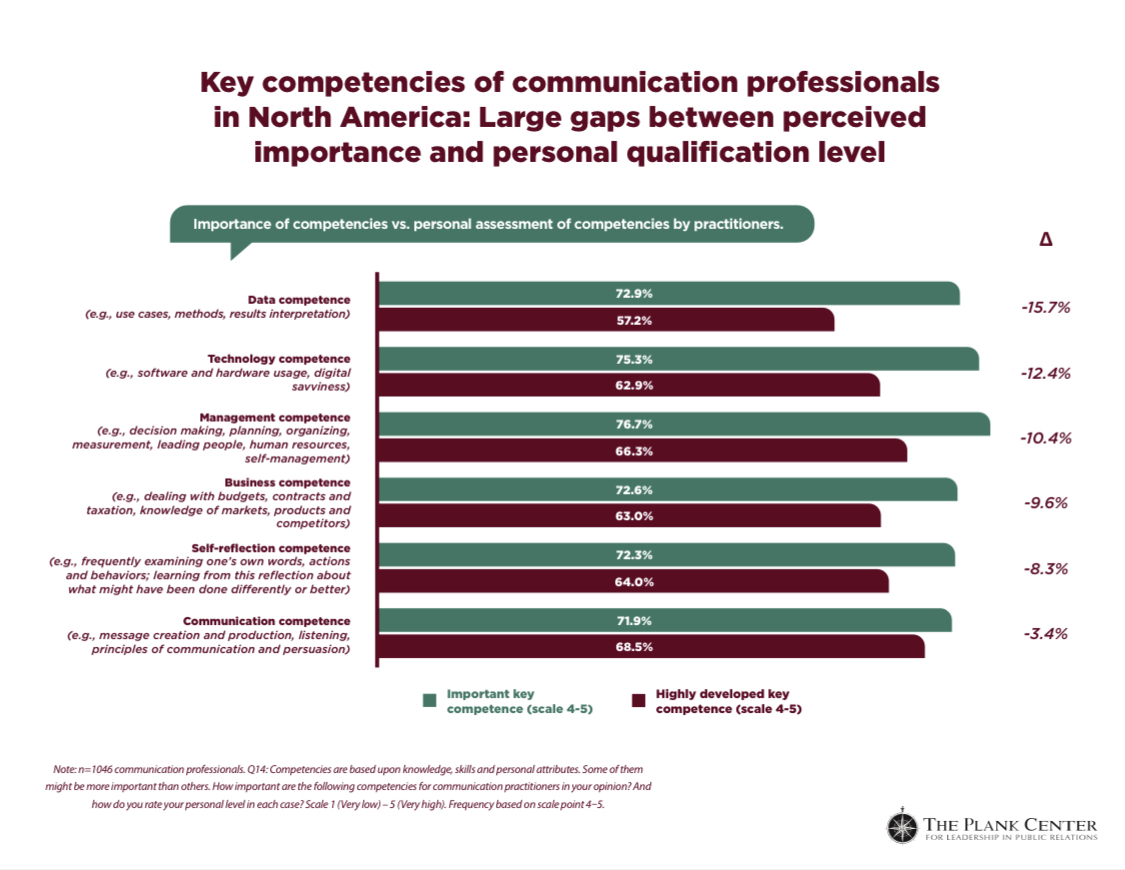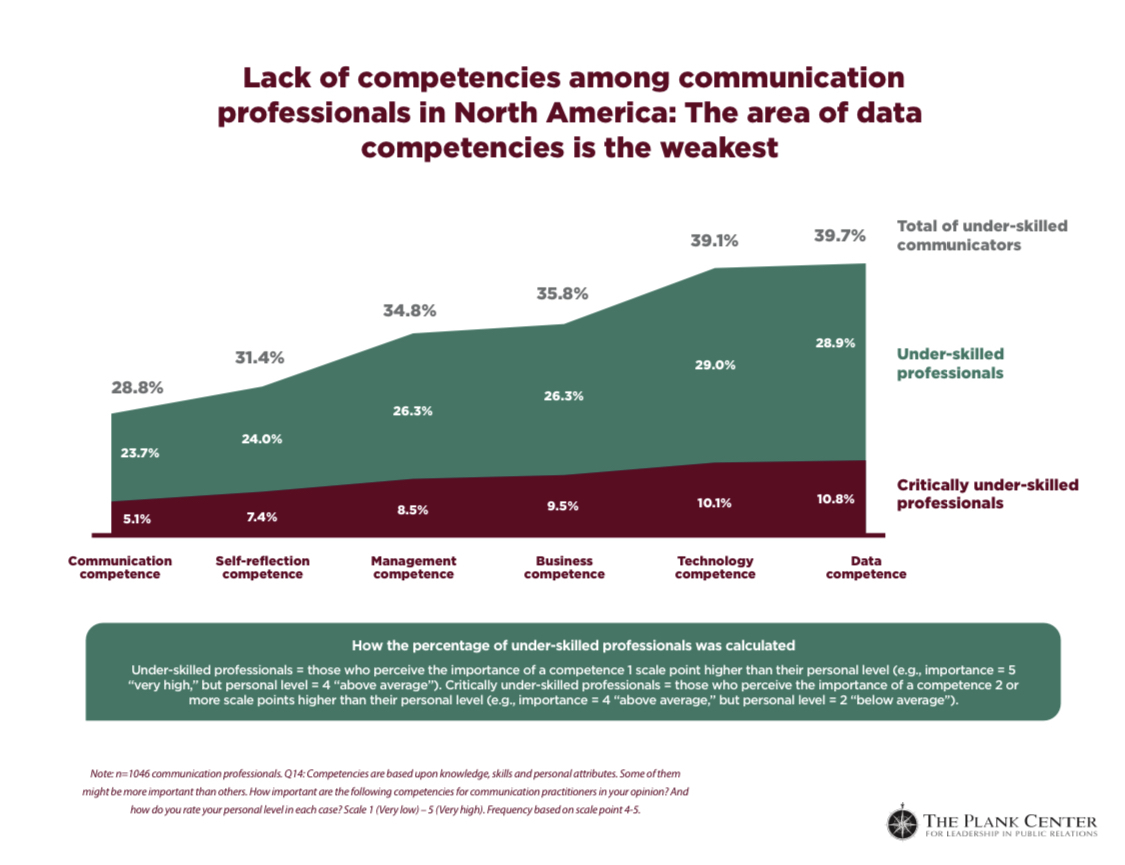
Digital acumen is essential for communication management in today’s technology-driven communication environment. However, not every communication professional is well equipped with the knowledge and skills needed to succeed in managing the digital aspects of their daily practice. According to the 2020-2021 North American Communication Monitor (NACM) conducted by The Plank Center for Leadership in Public Relations, nearly two-thirds of communication professionals in our survey agree there is a great need for communicators to develop their competencies (65%). Reflecting this, half of them (52%) also confirm competency development is a heavily discussed topic in the communication profession in their country (i.e., Canada and the United States).
Although the need for competency development is widely expressed, the level of urgency varies across the ranks. Top communication leaders (i.e., Head of communication and agency CEO) address the strongest need (75%) to advance knowledge and skills if compared to leaders at the team level (64%), and communication professionals in general (54%). Perhaps a strong digital leadership is needed in this situation to embrace digital transformation and competency development.
If competencies are the key functional abilities in effective communication practice, the need for constant improvement shall be addressed and integrated into business strategy. The 2020-2021 NACM investigates six key competencies of communication professionals, including data, technology, management, business, self-reflection, and communication. The results reveal some significant discrepancies between perceived importance and personal qualification in three key areas: data, technology, and management as displayed in the chart below.

Consequently, when we calculated the amount of under-skilled professionals, the area of data competencies is the weakest: 40% lack data competencies. Specifically, 29% are under-skilled while 11% are critically under-skilled as documented in the chart below. Although communication professionals have been imprinted with the expectation that they are the communication experts in data analytics and have a high level of proficiency in developing data-driven insights, it is particularly striking to identify a lack of data competencies across all levels.

Thus, the central question becomes how can we close the gaps in data competencies? In a recent study, Digital Competencies in Communication Management published in the Journal of Communication Management, we explored the integrated roles between technology and communication. By setting the study in the broader background of the fourth industrial revolution, or so-called “Industry 4.0,” we investigated the types of skills and knowledge needed by communication professionals to develop digital competencies. The research efforts are made to develop a theoretical model of Readiness for Industry 4.0 in Communication Management.
We define the Readiness for Industry 4.0 as the perceived readiness of communication professionals in coping with the challenges brought by the new digital revolution in Industry 4.0. To be effective and successful in this digitally transformed working environment, communication professionals need to develop a digital acumen by acquiring specific knowledge and skills. We suggest at least five important dimensions that make up the digital mindsets of readiness, including:
1.) Cognitive analytics in communication management
2.) Data management in communication
3.) Information and communication technology (ICT) literacy
4.) Sensemaking skill for digital transformation
5.) Digital competency in crisis management
We argue that as the communication profession is in a time of rapid change and development accelerated by the digital transformation, expectations of communication professionals’ skill sets, competencies, and change management are evolving intensively. Simply investing in digital tools, hardware and software will not do the trick. Based on our conversations with senior executives in this research, visionary leadership roles and digitally-minded leaders are critical in building the confidence of readiness. From the educational perspective, education on public relations and communication management requires more updated components on technological development and relevant training and learning experience. Such evidence is also documented in the Commission on Public Relations Education 2017. Report (2018), Fast Forward: Foundations and Future State. Educators and practitioners shall collaborate to enhance students’ co-curricular involvement with a focus on digital competencies and digital analytics.
To know more key findings from this research, please check out our article: Digital Competencies in Communication Management: A Conceptual Framework of Readiness for Industry 4.0 for Communication Professionals in the Workplace.
![]()
 Juan Meng, Ph.D., is an associate professor in public relations and founding director of Go Global Choose China and the Cooperative Education programs at the University of Georgia. Her research interests include public relations leadership, leadership development, and global communication. Meng serves on the national board of advisors of The Plank Center for Leadership in Public Relations and is an elected member of the Arthur W. Page Society.
Juan Meng, Ph.D., is an associate professor in public relations and founding director of Go Global Choose China and the Cooperative Education programs at the University of Georgia. Her research interests include public relations leadership, leadership development, and global communication. Meng serves on the national board of advisors of The Plank Center for Leadership in Public Relations and is an elected member of the Arthur W. Page Society.
 Jeonghyun (Janice) Lee, MA, is a Ph.D. student in the Department of Advertising & Public Relations at the University of Georgia. Jeonghyun’s research focuses on leadership in communication and organizational crisis communication, as well as the affordances of new technologies for strategic communication practices.
Jeonghyun (Janice) Lee, MA, is a Ph.D. student in the Department of Advertising & Public Relations at the University of Georgia. Jeonghyun’s research focuses on leadership in communication and organizational crisis communication, as well as the affordances of new technologies for strategic communication practices.



